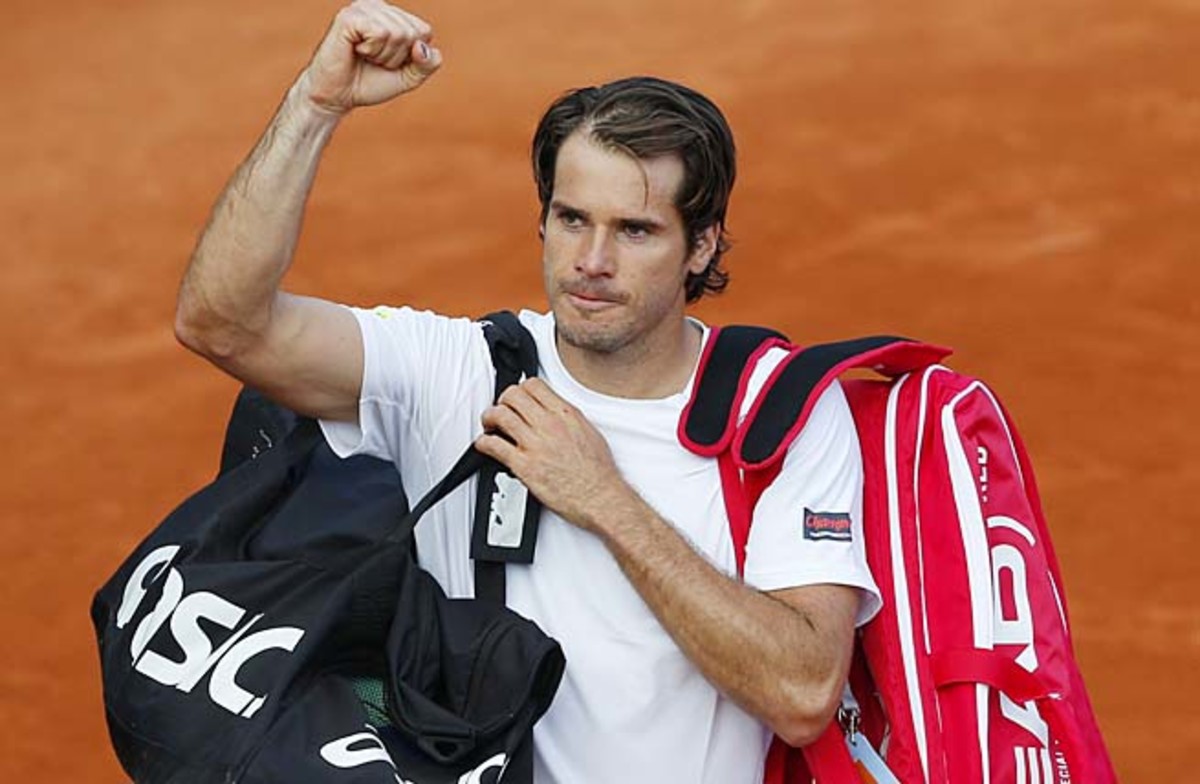Haas outlasts Isner in best match of French Open's first week


It's the bromide top players use at the Grand Slams: you can't win a Slam in the first week; you can only lose it.
Technically this is true. But there are -- especially on clay -- gradations and granules. You can break through, as the American Jamie Hampton did Saturday, beating Petra Kvitova and becoming the fourth American woman to make the Sweet 16. That hasn't happened at a Grand Slam since the 2004 U.S. Open.
You can flame out, as No. 13 seed Marion Bartoli did, inexplicably winning just three games against the ageless 2010 French Open champion Francesca Schiavone. You can make a statement, as Novak Djokovic did in schooling Grigor Dimitrov 6-2, 6-2, 6-3. On Saturday, French newspaper L'Equipe ranked Dimitrov as the No. 1 player in the world ... in 2018. You can try and find your mojo and form as Rafael Nadal did with only some success, beating Fabio Fognini 7-6 (5), 6-4, 6-4.
And you can record a signature victory that will help define your career.
In what was less a tennis match than a four-and-a-half-hour infomercial for guts, Tommy Haas beat John Isner 7-5, 7-6 (4), 4-6, 6-7 (10), 10-8. No scoreline or match stats will give effect to the quality and drama of what played out on Court 1, the Bullring, a fitting stage for this kind of battle. At age 35, Haas is playing some of the most inspired tennis of his career, one that always had great promise but was ravaged by injury. Head, shoulder, knees and toe -- name a body part and, odds are good, Haas not only injured it but then missed a chunk of the season in rehab.
But he's gotten some years on the back end in exchange, and already this year, he's beaten Novak Djokovic on a hard court and won a clay event in his native Germany. Bringing his skills, his experience and his stop-traffic-gorgeous one-handed backhand to bear Saturday afternoon, Haas took a two-set lead on Isner. Then, the last American male left in the draw won the third set, breaking Haas and firing off serves fit for ballistic tests.
Paire breaks racket, argues with umpire, referee in loss
In the fourth, Haas worked himself to match point on 12 occasions. Each time he was denied. A good many came when Isner courageously came up with aces and service winners. No shame there. But in a tiebreaker, Haas had the match on his racket ... and double-faulted. Haas almost appeared too stunned to lash out at himself.
"I forget how many (match points) I even had," he said.
A few points later, Isner closed out the tiebreaker. And he was where he always seems to be at majors: in a fifth set.
The conventional wisdom is that the decisive set in tennis is a mental battle rather than physical one. This is another tennis bromide in need of revisiting. Isner scored an early break and lead 3-0, Haas appearing to be paralyzed by the blown opportunities from the previous set.
But then Haas regrouped. And across the net, Isner wilted. Having played nearly four hours the previous day in a 5-7, 6-7 (7), 6-3, 6-1, 8-6 win over Ryan Harrison, Isner appeared to have cinderblocks tied to his legs. On Haas' service games, Isner barely tried, cautious to ration his energy. A few balls into a rally, he sought to shorten the points. At changeovers, he was reluctant to sit down in his chair, lest he cramp.
"In hindsight, probably would have been better to lose in straight sets, because I feel terrible right now," Isner said. "These long matches seem to follow me."
As the match eclipsed the 6-6 mark -- and announcers either complained about the absence of a tiebreaker or referenced Isner's historic 70-68 Wimbledon match with Nicolas Mahut -- Haas was conspicuously fresh. It was somehow fitting that the body that had betrayed him so many times throughout his career was now going to win him the match.
"I was definitely hoping it wasn't going to go like in Wimbledon with him and Mahut," Haas said. "I was probably going to wave the white flag before that."
After breaking Isner's serve at 8-8, Haas jogged to his chair, pumping his fist. This time when he got to match point -- lucky No. 13 -- he played cautiously, angling a serve in the box. Isner cooperated and drove a backhand wide. Game, set, match of the tournament.
One shutters to think how this match would have affected Haas, had he lost. Twelve squandered match point during the middle weekend of a Grand Slam? Buy your psychotherapy units in advance. But, instead this will rank among the happier memories of his career.
"Unfortunately one has to lose, and I think it would have been more upsetting for me in this case," Haas said. "It was a big roller coaster with not many thoughts in between. ... It's definitely going to be one of the best matches to look back on, for sure."
Both players left the Bullring to a well-deserved standing O. On this day, Haas was the winning matador. It was 8:30 in the evening and, though the sun was diminishing, there was still some light in the sky.
